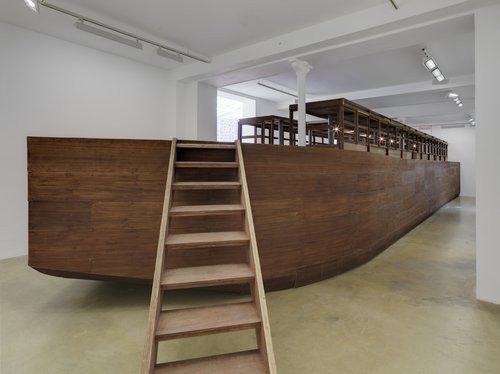Rirkrit Tiravanija
05 May - 17 Jun 2010

© Rirkrit Tiravanija
Untitled (asile flottant), 2010
Bois, métal, t-shirts, buste de mannequins, dessins
Wood, metal, T-shirts, mannequin busts, drawings
Dimensions variables / Variable dimensions
Photo credit: Florian Kleinefenn
Untitled (asile flottant), 2010
Bois, métal, t-shirts, buste de mannequins, dessins
Wood, metal, T-shirts, mannequin busts, drawings
Dimensions variables / Variable dimensions
Photo credit: Florian Kleinefenn
RIRKRIT TIRAVANIJA
May 5 - June 17, 2010
In Thailand monks predict that their country’s fate lies in water - flooding will destroy their homeland, cities in the north whose names begin with either “Chiang” or “Lam” will be spared, all the others will be ravaged by the deluge.
For his fourth solo show at Galerie Chantal Crousel, aptly titled Asile Flottant, the artist Rirkrit Tiravanija has constructed a sketch of Le Corbusier’s boat of the same name and inserted a section of it into the gallery. Le Corbusier’s barge was designed for the Salvation Army literally as a floating asylum meant to provide temporary overnight shelter for vagrants wandering the streets of Paris. Tiravanija’s barge, constructed in Chiang Mai, Thailand, will serve as a pavilion that houses both political T-shirts designed by the artist, and others that have been collected from all over the world. Highlighting the ability of what we wear to act as a platform for interaction and communication, Tiravanija activates the T-shirt as political space.
May 5 - June 17, 2010
In Thailand monks predict that their country’s fate lies in water - flooding will destroy their homeland, cities in the north whose names begin with either “Chiang” or “Lam” will be spared, all the others will be ravaged by the deluge.
For his fourth solo show at Galerie Chantal Crousel, aptly titled Asile Flottant, the artist Rirkrit Tiravanija has constructed a sketch of Le Corbusier’s boat of the same name and inserted a section of it into the gallery. Le Corbusier’s barge was designed for the Salvation Army literally as a floating asylum meant to provide temporary overnight shelter for vagrants wandering the streets of Paris. Tiravanija’s barge, constructed in Chiang Mai, Thailand, will serve as a pavilion that houses both political T-shirts designed by the artist, and others that have been collected from all over the world. Highlighting the ability of what we wear to act as a platform for interaction and communication, Tiravanija activates the T-shirt as political space.
